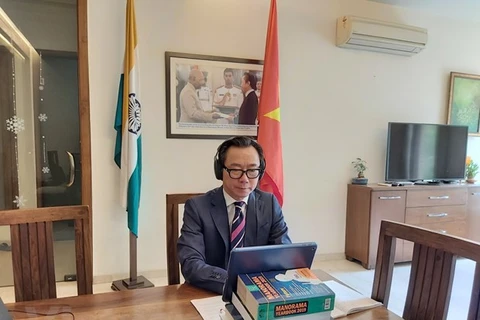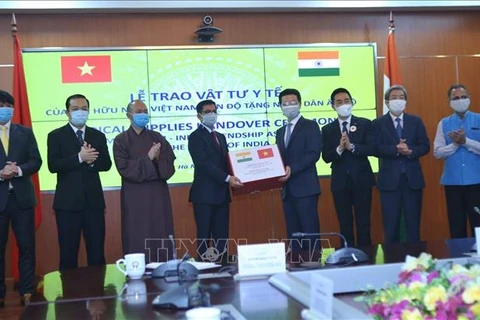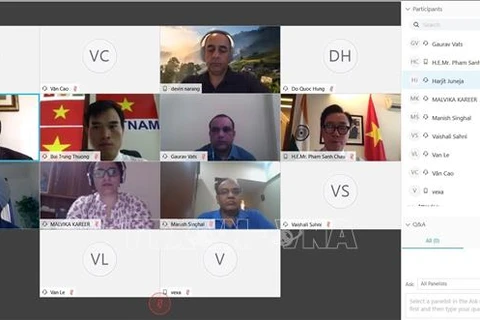 The meeting, which took place in the form of teleconferencing, reviewed the bilateral comprehensive strategic partnership since the 16th edition in August 2018, and put forth measures and orientations for cooperation in the new period. (Photo: VNA)
The meeting, which took place in the form of teleconferencing, reviewed the bilateral comprehensive strategic partnership since the 16th edition in August 2018, and put forth measures and orientations for cooperation in the new period. (Photo: VNA) Hanoi (VNA) – Deputy Prime Minister and Foreign Minister Pham Binh Minh and Indian Minister of External Affairs Subrahmanyam Jaishankar on August 25 co-chaired the 17th Meeting of the Joint Commission on Economic, Commercial, Scientific and Technological Cooperation between Vietnam and India.
The meeting, which took place in the form of teleconferencing, reviewed the bilateral comprehensive strategic partnership since the 16th edition in August 2018, and put forth measures and orientations for cooperation in the new period, towards the 50th anniversary of the bilateral diplomatic ties (January 26, 1972-2022).
Minh said the Vietnam-India traditional friendship and comprehensive strategic partnership are developing fruitfully, and the mutual political trust has been consolidated through regular visits and meetings at all levels, via Party, State, Government, National Assembly and locality channels, as well as people-to-people exchanges.
He recalled the phone talks between Prime Minister Nguyen Xuan Phuc and his Indian counterpart Narendra Modi in April amidst the COVID-19 outbreak, saying the two sides agreed to intensify their existing cooperation mechanisms, and soon take stock of the implementation of the 2017-2020 action programme materialising the comprehensive strategic partnership.
Minh and Jaishankar shared the view that the two countries should continue with their close coordination, and the sharing of information and experience in the pandemic fight, both bilaterally and multilaterally.
The Indian minister lauded the Vietnamese government’s efforts and measures against the pandemic, and briefed Minh on countermeasures adopted by the Indian government.
Minh spoke highly of India’s cooperation in consular affairs and citizen protection work.
They reached consensus that defence and security is among the key, effective cooperation areas between the two countries, and highly valued the Vietnam-India National Defence Policy Dialogue and Security Dialogue.
Vietnam applauds India’s support and experience exchange in training peace-keeping forces, Minh said.
He called on the two countries to boost trade and investment ties in the time ahead, and effectively implement outcomes of the fourth meeting of the joint sub-committee on trade that was held in January 2019.
Vietnam and India should maintain the momentum of trade collaboration in order to bring two-way trade to 15 billion USD as soon as possible, and sign a memorandum of understating on cooperation in trade remedy at an early date, thus bringing practical interests to businesses of both sides, Minh said.
The Indian minister pledged to consider Vietnam’s proposals regarding the easing and removal of technical barriers imposed on Vietnam’s exports.
The two sides agreed to call for investments in the areas of India’s strength and Vietnam’s priority like information-technology, energy, infrastructure, and high-tech agriculture.
Both officials said that Vietnam and India hold substantial potential for further cooperation in science-technology, energy, culture, and tourism and people-to-people exchanges, and concurred to soon organise a meeting of the working group on health care in order to address obstacles in the bilateral medical ties.
Minh also appreciated the two sides’ mutual support for each other’s candidacy of multilateral organisations and forums, and thanked India for its assistance to Vietnam within the Mekong-Ganga River Cooperation framework.
Jaishankar affirmed that India attaches importance to ASEAN’s centrality in the region and praised Vietnam’s coordinating role in the ASEAN-India relations during the 2015-2018 period.
They stressed the significance of maintaining peace, stability, security, safety and freedom of navigation and aviation, and the peaceful settlement of disputes in the East Sea in line with international law, especially the UN Convention on the Law of the Sea (1982 UNCLOS).
The two sides announced two important documents signed on this occasion, comprising a memorandum of understanding on cooperation between the Diplomatic Academy of Vietnam and the Indian Sushma Swaraj Institute of Foreign Service, and another on cooperation between the Vietnam Institute of Seas and Islands and the Indian National Maritime Foundation./.
VNA






















